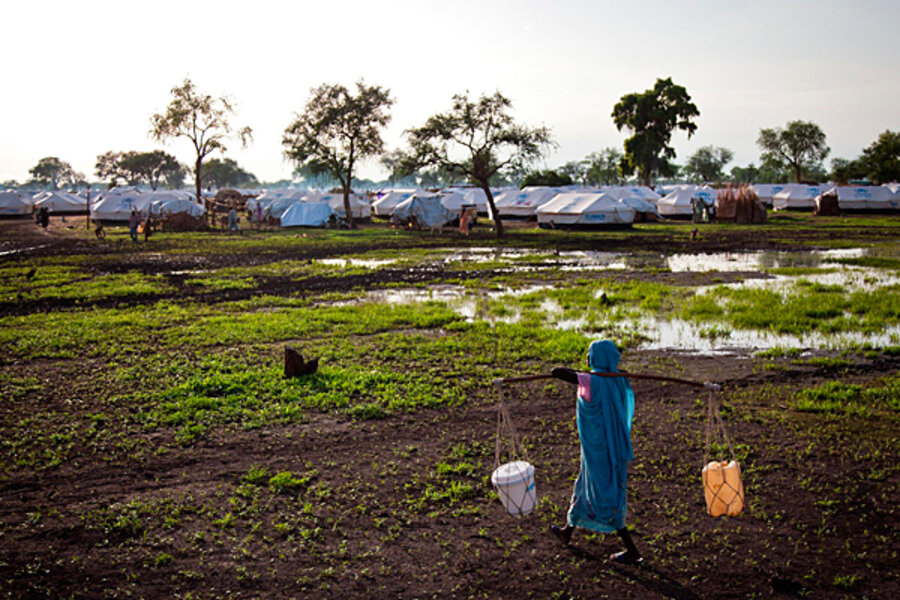One year on, South Sudan struggles to survive
Loading...
One year ago, South Sudan became the world’s newest nation. Today, it has oil wealth it can't ship to market, impoverished citizens it can't seem to feed or house, and a feud with Khartoum it can't seem to end.
Turning the landlocked but oil rich South Sudan into a functioning country was never going to be easy, of course. But doing so in the midst of an economic dispute with its neighbor and rival, Sudan – a dispute over how much money South Sudan should pay Sudan to pump oil through Sudan’s pipelines and out to international markets – has been crushing. If South Sudan was a baby, it has been deprived of nutrition for the first year of its life.
More dangerously, South Sudan and Sudan have come close to launching a full-out war, as Sudanese jets bomb villages inside South Sudanese territory, and as South Sudanese troops invaded to take control, briefly, of Sudan’s last giant oil-producing town of Heglig. Both nations claim the Heglig fields and lingering boundary disputes continue to keep these two nations on war footing.
Talks between Sudan and South Sudan resumed Thursday in Addis Ababa, and the United Nations has given the two countries two months to resolve their differences. A previous round of talks ended last week, with no progress.
South Sudan is not the first nation to be born in the midst of conflict, of course. The United States broke away from Britain for very similar reasons as South Sudan had for breaking from Sudan: the sense that the colonial masters were profiting more from America’s natural wealth than Americans were. But just as America’s independence was very nearly snuffed out by much better armed and prepared British troops in the Revolutionary War, so South Sudan is paying dearly for its disputes with Khartoum.
More than 400,000 people of South Sudanese descent have moved to South Sudan since 2010, and hundreds of thousands more remain in Sudan proper. Many of these people have no housing, no regular access to running water or sanitation, or to adequate health care. There are not enough schools to accommodate the children of these newcomers, and not enough jobs for the young men and women who left behind a better economic life in the cities of the north.
"The foundation of a peaceful and prosperous South Sudan can be strong only if we invest in the country's youngest citizens. They need to be everyone's priority so that the next generation can play an active and meaningful part in building this new nation,” said Dr. Yasmin Ali Haque, UNICEF representative in South Sudan, in an e-mailed statement. "The children of this country deserve a better future and it is critical that long term predictable investment is available and translates into real gains for them.”
As bad as things are, the West is not going to abandon the new nation that it spent so much time and political capital in bringing to life. Food aid keeps the poorer citizens of South Sudan alive, UN and private aid groups have fanned out across the countryside in white SUVs to help South Sudan develop the capacity to build a sustainable economy, manage its resources, and govern itself.
But the economic reality check of running a country has been a shock. Inflation for fuel and food prices in February shot up 21 percent from the same time last year, and then another 80 percent in May, according to Oxfam International. Inflation like that puts ordinary foodstuffs out of the price range of even those South Sudanese who do have savings; today 9.7 million are facing food shortages.
“The jubilation of independence is now tempered by the reality of a daily struggle to survive,” said Helen McElhinney, Oxfam policy adviser, in an e-mailed statement. “Some people are living on one meal a day and double the number of people are in need of food aid compared to last year. Refugees are enduring dire conditions in border camps with not enough water to go around.”
South Sudan’s rulers – all of them members of a former rebel army, the Sudanese People’s Liberation Movement, turned political party – note that they have the people’s support, and they will finish the task they set out to do. (More than 95 percent of South Sudanese voted for secession in a referendum held in January 2010.)
The question is whether South Sudan can hold itself together until an acceptable deal can be worked out with Sudan. Indeed, this is the same question that Sudan itself is faced with. Losing South Sudan meant the loss of 75 percent of Sudan’s proven oil reserves, and Sudan has responded with cutbacks in subsidies and other austerity measures that have sparked street protests by Sudanese university students in recent weeks. On Thursday, officials from both countries met in Addis Ababa to begin discussions over boundary and oil-revenue disputes.
In the meantime, South Sudanese officials remain defiant.
“We're not going to collapse, we're going to survive until the problem of oil is resolved,” said Atem Yaak Atem, a government spokesman, according to Agence France Presse.







